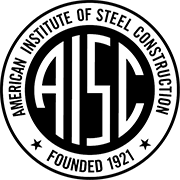AISC
University of Wyoming Study Finds Steel Bridge Greener, More Economical Than Concrete Counterpart
June 7, 2022
FOR IMMEDIATE RELEASE
CHICAGO - A team of researchers compared two functionally equivalent rural bridges to evaluate sustainability and life cycle cost, and the steel bridge outperformed its concrete counterpart across the board.
Over the bridges' life cycles, the steel bridge will result in 26.3% fewer embodied CO2e emissions, consume 8.7% less energy, and lead to 17.8% more recycled material (assuming the concrete is recycled at all) at the end of its service life--plus, the steel bridge's life cycle cost is 23% lower than that of the concrete bridge.
"These findings are frankly not at all surprising," said National Steel Bridge Alliance Senior Director of Market Development Jeff Carlson, PE. "This direct comparison of two functionally equivalent bridges confirms what we've known for years: that steel is the most sustainable and economical structural material out there--both when a bridge is built and for the duration of its service life."
Michael Barker, PE, of the University of Wyoming's Civil & Architectural Engineering & Construction Management program led a team that evaluated two real bridges in Whitman County, Wash. Both bridges meet the two-lane rural crossing requirements and were built by the same crew. The study considered only the superstructures of these bridges to allow a direct comparison.
The Seltice-Warner bridge is a roughly 36-ft-long prefabricated, modular steel bridge with seven rolled beams and a corrugated gravel deck. The Thornton Depot bridge, meanwhile, is a 34-ft-long prefabricated, precast, pre-stressed concrete girder bridge with eight beams and a concrete deck. The Whitman County, Wash. bridge crew built them within the last three years.
Researchers evaluated both bridges throughout their construction, maintenance, and demolition phases according to four sustainability criteria:
-
Embodied carbon and equipment emissions (measured in kg of CO2e),
-
Embodied and equipment energy consumption (measured in MJ),
-
Waste management and recyclability (measured by percent weight recycled), and
-
Life cycle cost (measured in present values).
Although "the decision on which bridge type to select is clear," as the report says, researchers also developed a series of procedures to help society or a bridge's owner consider sustainability for more expensive projects.
"The historical decision criteria for choosing which bridge should be built is based on first costs for installing the bridge," the authors noted. "Responsible owners may also consider life cycle costs over the bridge service life. Neither of these consider sustainability benefits of one bridge over another.
"Sustainable design is predicated on the idea that society is willing to pay extra for reducing harmful effects on the environment. The owner or society determines an acceptable additional cost they are willing to pay for reducing emissions, reducing energy consumption, or reducing material sent to the landfill."
The full study is available online, as is a Short Span Steel Bridge Alliance video in which Michael Barker reviews the research methods and findings.
The American Iron and Steel Institute and Short Span Steel Bridge Alliance provided oversight for this independent research.
###
For more information contact:
Dani Friedland
Director of Marketing Communications
773.636.8535
friedland@aisc.org
American Institute of Steel Construction
The American Institute of Steel Construction, headquartered in Chicago, is a non-partisan, not-for-profit technical institute and trade association established in 1921 to serve the structural steel design community and construction industry. AISC's mission is to make structural steel the material of choice by being the leader in structural steel-related technical and market-building activities, including specification and code development, research, education, technical assistance, quality certification, standardization, market development, and advocacy. AISC has a long tradition of service to the steel construction industry of providing timely and reliable information.
130 E. Randolph St, Suite 2000
Chicago IL 60601
312.670.2401
www.aisc.org
